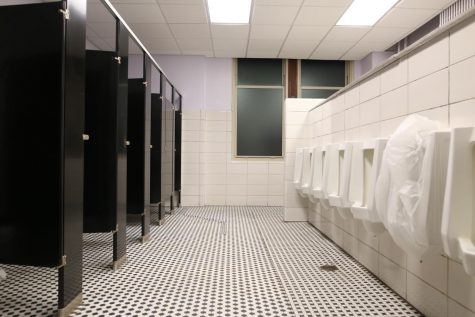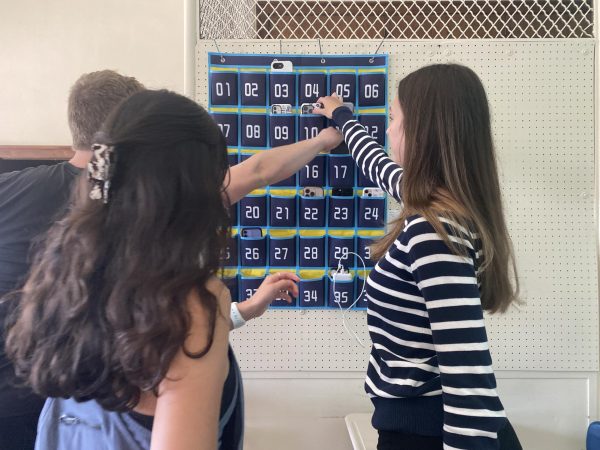Pissed off? Opinions on Lane’s bathroom policies and potential health risks

Lane’s bathroom policy differs from teacher to teacher. Some let students go freely while others have restrictions.
Think about having to use the bathroom. Now hold that thought, just as many students hold their bladders.
“Sometimes we really can’t hold it,” Heidi Garcia, Div. 985, said, expressing her opinions on Lane’s differing restroom policies.
Bathroom policies vary from classroom to classroom. Policies range from strict to lax, solely depending on the class and teacher.
There are no clean cut rules on bathroom policies, besides the ten minute rule, which prevents students from using the bathroom in the first and last ten minutes of class.
Mr. Telles, an English teacher, leans towards a “free-flowing” bathroom policy, which gives more responsibility to students, encouraging them to choose a proper time to leave for the restroom.
“Within the policy, I tell them, ‘You guys are young adults, you don’t have to ask me to use the bathroom,’” Telles said. “This is not a prison. Pick the proper time to go. As long as they adhere to the rule, it’s really not a big deal.”
He also said the bathroom policy could influence the atmosphere of the classroom.
“It makes a collaborative environment, where we are kinda working together, it’s not ‘Me vs. You,’ it’s just us together,” Telles said.
Robert Szymczyk, Div. 973, commented on bathroom policies which limit the number of times students are allowed to use the restroom.
“I think that students should have the ability to go to the bathroom whenever they want,” Szymczyk said. “It shouldn’t be dictated by the teacher whether or not the student is allowed to go for a natural function.”
While not in complete opposition to the idea of a lax policy, Mr. Neesan, a math teacher, has a specific policy, delegating four passes to each student every semester. However, Neesan does allow students to use the restroom in emergency situations, even if a student has run out of passes.
“The reason I do it is that I want the kids to be successful in my class, to do that you basically have to be in class for the most amount of time possible,” Neesan said.
Neesan, doing some math, added up his reasons for a more concrete policy.
“Let’s say you have seven classes, and let’s say everyone had my policy, that’s 28 times you can go to the bathroom, besides the five minute passing period; to me that’s more than fair and more than enough,” Neesan said.
Sophia Haloulos, Div. 965, who has both Neesan and Telles as teachers, commented on the different effects the bathroom policy has on both classroom environments.
“Telles’ room is more of a workshop where we are encouraged to be independent and productive, along with being able to get up and take the bathroom pass whenever needed without needing to ask or interrupt,” Haloulos said. “Neesan’s class is more of a lecture/practice class as the math material is much more intense, and you need to ask if it is a good time to use the restroom to make sure you are not missing anything important.”
Haloulos said that although Neesan’s policy is stricter, she understands why it is necessary.
“I understand that because his math classes are harder, he wants his students in class for as much time as possible,” Haloulos said.
Daniel Sergent, Div. 954, described a choice students sometimes have to make between saving passes for extra credit and using the bathroom.
“That’s awful,” Sergent said. “Especially when they offer extra credit for it because I’m like, ‘Do I need to go to the bathroom, or should I save it for the extra credit?’ and I don’t want to go to the bathroom then.”
In contrast to some teachers that implement an extra credit policy, Neesan said his passes cannot be used as extra credit towards a grade.
While the policy itself may be up for debate, there are costly health consequences that come with not going to the bathroom enough times during the day.
Health complications such as kidney stones, constipation and infections can all be linked to lack of bathroom usage.
Dr. Jennifer Hebert-Beirne, Assistant Professor in the School of Public Health at University of Illinois at Chicago specializing in pelvis and urology health, expanded in depth on these complications and their effects on students’ physical and mental health.
“Any situation that interrupts the natural brain-bladder connection is concerning,” Hebert-Beirne said. “Students who find themselves, because of these policies, unable to control their bladders, face serious social consequences from a public accident or leakage. The social stigma that follows the student, as well as the emotional trauma, can have long term consequences.”
Missy Lavender, CEO of Below Your Belt, an organization created to educate young girls on the importance of pelvic health, described how bathroom policies, which frown on students leaving to use the restroom, are counterintuitive.
“The concept of a child having to make a ‘big deal’ out of a normal bodily function is so contra to being healthy,” Lavender said.
While solutions to the bathroom policy remain arguable, Hebert-Beirne brought up the need to reevaluate health consequences of bathroom policies in place.
“Institutions like schools and employers can reconsider the health impacts of their bathroom access policies and provide more flexible, adaptive policies,” Hebert-Beirne said.
Lavender added that solutions must begin with an increase in awareness and education.
“We should be thinking about creating policies that deal with healthy bathroom visits,” Lavender said. “I think [solutions] must start with consumer and healthcare provider education. The last time most of us talked about our bladder or bowels, we were three.”
Your donations directly fund the Lane Tech student journalism program—covering essential costs like website hosting and technology not supported by our school or district. Your generosity empowers our student reporters to investigate, write, and publish impactful stories that matter to our school community.
This website is more than a publishing platform—it's an archive, a research tool, and a source of truth. Every dollar helps us preserve and grow this resource so future students can learn from and build on the work being done today.
Thank you for supporting the next generation of journalists at Lane Tech College Prep!

A new face to LT’s Warrior, Caroline, currently a junior, is a very busy person. She has done soccer, track, and cross country in years past. Her favorite...

Roman Treuthart is a junior at Lane and this is his first year taking any type of journalism class. Outside of class, he has been taking photos passionately...



